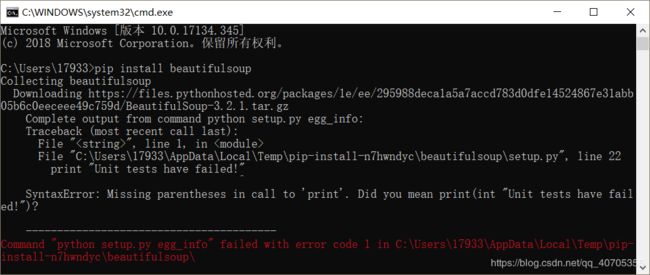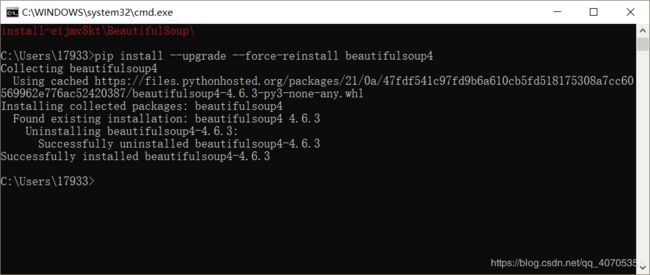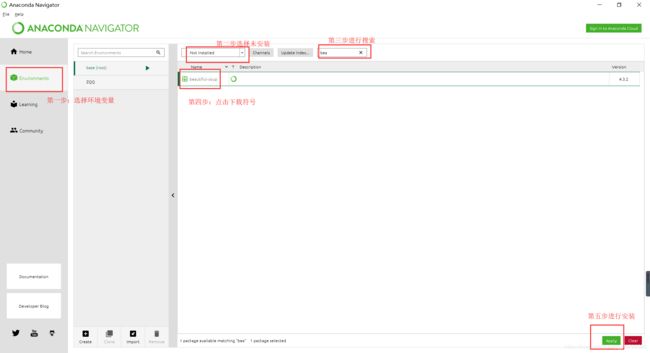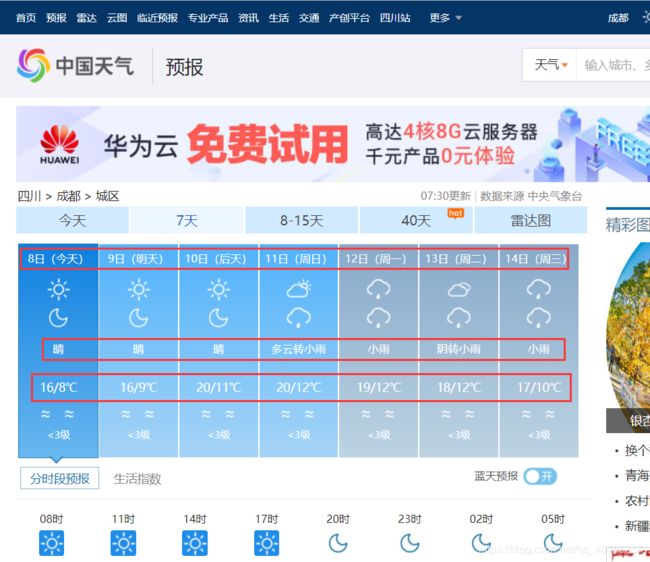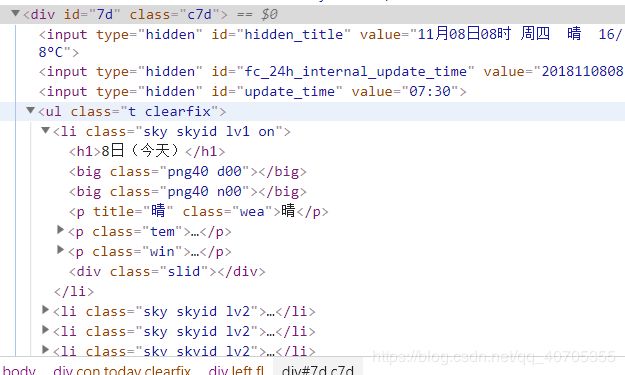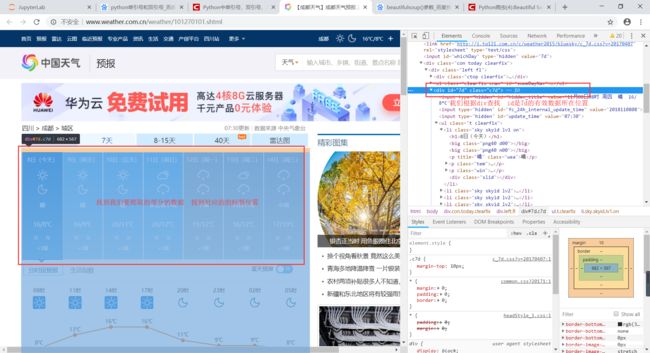Python爬虫入门实战--------一周天气预报爬取
最近学校刚开始开设爬虫课,我也刚刚如入门,尝试写了一个爬去成都市的一周的天气预报。
目录
一、软件和库的准备:
二、爬虫的编写:
三、全部代码
一、软件和库的准备:
-
python环境安装配置:安装python所需要的环境(此处就不详细的进行说明了,百度查询),最好是使用python3.x版本,虽然现在大部分公司的项目都还是在使用2.x版本,但是3.x才是目前主流的,以后的项目肯定使用3.x居多。
-
编辑器:选择一个合适的编辑器,python有许多编辑器,但是题主推荐使用pycharm和jupyter,具体安装过程这里就不再进行说明,安装jupyter使用Anaconda一体式安装要方便快捷一点。
- urllib库:这个安装python自带的库,也可以使用第三方更加方便强大的库requests,这个库需要自己去手动安装,在cmd里面使用pip install requests安装就好了
- csv库:属于安装pytohn环境自带的库,不需要再去手动安装
- BeautifulSoup库:这个库需要手动安装,BeautifulSoup是一个网页解析库,它支持很多解析器,不过最主流的有两个。一个是python标准库,一个是lxml HTML 解析器。两者的使用方法相似:
frombs4importBeautifulSoup
# Python的标准库
BeautifulSoup(html,'html.parser')
# lxml
BeautifulSoup(html,'lxml')
- 使用pip安装 pip install beautifulsoup安装,如果出现这种问题:
SyntaxError: Missing parentheses in call to 'print'. Did you mean print(int "Unit tests have failed!")?
----------------------------------------
Command "python setup.py egg_info" failed with error code 1 in C:\Users\17933\AppData\Local\Temp\pip-install-n7hwndyc\beautifulsoup\
是因为是python3.6对beautifulsoup4支持不够好
就需要使用pip install --upgrade --force-reinstall beautifulsoup4安装;
如果是使用的Anaconda安装就方便多了,直接在环境里面点击安装就好了
二、爬虫的编写:
- 相关包的导入:
import csv import urllib.request from bs4 import BeautifulSoup ## 引入解析模块BS4 - 模拟浏览器得到数据
url = "http://www.weather.com.cn/weather/101270101.shtml" header = ("User-Agent","Mozilla/5.0 (Windows NT 10.0; Win64; x64) AppleWebKit/537.36 (KHTML, like Gecko) Chrome/69.0.3497.100 Safari/537.36") # 设置头部信息 opener = urllib.request.build_opener() # 修改头部信息 opener.addheaders = [header] #修改头部信息 request = urllib.request.Request(url) # 制作请求 response = urllib.request.urlopen(request) # 得到请求的应答包 html = response.read() #将应答包里面的内容读取出来 html = html.decode('utf-8') # 使用utf-8进行编码,不重新编码就会成乱码 - 查找要爬取的部分
我们在页面上找到我们所需要的信息部分 ,我们需要日期、天气以及温度
找到对应的代码部分
全图如下:
# 以上部分的代码如下:
final = [] #初始化一个空的list,我们为将最终的的数据保存到list
bs = BeautifulSoup(html,"html.parser") # 创建BeautifulSoup对象
body = bs.body # 获取body部分
data = body.find('div',{'id':'7d'}) # 找到id为7d的div之后我们再往下看,我们所需要的信息都存在ul标签中,我们需要查找ul标签
ul = data.find('ul') # 获取ul部分,由于ul标签只有一个 我们使用find()函数,如果有多个我们使用find_all()
所需要的信息在ul标签里面的li标签内部,而且不止一个,所以我们需要使用find_all()方法
li = ul.find_all('li') # 获取所有的li 返回的是list对象
4.对查找到部分进行数据的爬取
我们最后将所有的数据保存在list之中在进行写入文件
日期在li标签的h1标签之中
天气在li标签的第一个p标签之中
温度在第二个p标签之中的span标签之中
i = 0
for day in li: # 对每个li标签中的内容进行遍历
if i < 7:
temp = []
date = day.find('h1').string # 找到日期
# print (date)
temp.append(date) # 添加到temp中
# print (temp)
inf = day.find_all('p') # 找到li中的所有p标签
# print(inf)
# print (inf[0])
temp.append(inf[0].string) # 第一个p标签中的内容(天气状况)加到temp中
if inf[1].find('span') is None:
temperature_highest = None # 天气预报可能没有当天的最高气温(到了傍晚,就是这样),需要加个判断语句,来输出最低气温
else:
temperature_highest = inf[1].find('span').string # 找到最高温度
temperature_highest = temperature_highest.replace('℃', '') # 到了晚上网站会变,最高温度后面也有个℃
temperature_lowest = inf[1].find('i').string #找到最低温度
temperature_lowest = temperature_lowest.replace('℃', '') # # 最低温度后面有个℃,去掉这个符号
temp.append(temperature_highest)
temp.append(temperature_lowest)
final.append(temp) # 将每一次循环的list的内容都插入最后保存数据的list
i = i +15.写入文件:
with open('weather.csv', 'a', errors='ignore', newline='') as f:
f_csv = csv.writer(f)
f_csv.writerows(final)
三、全部代码
import csv
import urllib.request
from bs4 import BeautifulSoup
url = "http://www.weather.com.cn/weather/101270101.shtml"
header = ("User-Agent","Mozilla/5.0 (Windows NT 10.0; Win64; x64) AppleWebKit/537.36 (KHTML, like Gecko) Chrome/69.0.3497.100 Safari/537.36") # 设置头部信息
opener = urllib.request.build_opener() # 修改头部信息
opener.addheaders = [header] #修改头部信息
request = urllib.request.Request(url) # 制作请求
response = urllib.request.urlopen(request) # 得到请求的应答包
html = response.read() #将应答包里面的内容读取出来
html = html.decode('utf-8') # 使用utf-8进行编码,不重新编码就会成乱码
final = [] #初始化一个空的list,我们为将最终的的数据保存到list
bs = BeautifulSoup(html,"html.parser") # 创建BeautifulSoup对象
body = bs.body # 获取body部分
data = body.find('div',{'id':'7d'}) # 找到id为7d的div
ul = data.find('ul') # 获取ul部分
li = ul.find_all('li') # 获取所有的li
# print (li)
i = 0
for day in li: # 对每个li标签中的内容进行遍历
if i < 7:
temp = []
date = day.find('h1').string # 找到日期
# print (date)
temp.append(date) # 添加到temp中
# print (temp)
inf = day.find_all('p') # 找到li中的所有p标签
# print(inf)
# print (inf[0])
temp.append(inf[0].string) # 第一个p标签中的内容(天气状况)加到temp中
if inf[1].find('span') is None:
temperature_highest = None # 天气预报可能没有当天的最高气温(到了傍晚,就是这样),需要加个判断语句,来输出最低气温
else:
temperature_highest = inf[1].find('span').string # 找到最高温度
temperature_highest = temperature_highest.replace('℃', '') # 到了晚上网站会变,最高温度后面也有个℃
temperature_lowest = inf[1].find('i').string #找到最低温度
temperature_lowest = temperature_lowest.replace('℃', '') # # 最低温度后面有个℃,去掉这个符号
temp.append(temperature_highest)
temp.append(temperature_lowest)
final.append(temp)
i = i +1
# print(final)
with open('weather.csv', 'a', errors='ignore', newline='') as f:
f_csv = csv.writer(f)
f_csv.writerows(final)
四、感受
爬虫大致分为四步:
1.写好模拟浏览器请求头
2.明确你要爬取那些数据
3.将数据爬取下来并保存(这是最难的一步)
4.将数据保存到文件
大家对我的文章如有什么见解,请留言,我们一起进步。
如果此文章对你有所帮助那就是我最大的荣幸,请为我留下一个赞,算是随我莫大的鼓励。

